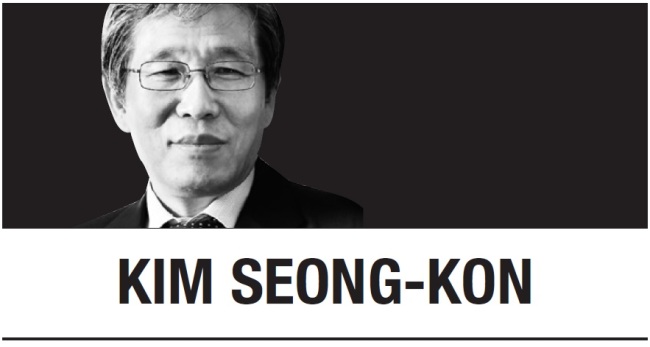[Kim Seong-kon] Things Seoul, Beijing, Tokyo and Washington should know
By Kim Seong-konPublished : Feb. 27, 2018 - 17:36
 Recently in his blog titled “South Korea: The Unappreciated Ally,” my colleague Gregg A. Brazinsky posted three important issues regarding the Korean Peninsula. One of them was Washington’s misconception of South Korea. While mentioning South Korea’s emergence as a global economic leader, he wrote, “Unfortunately, it is not always treated as one by the United States. Washington has never completely abandoned the patron state mentality that was born decades ago when the country was completely dependent on American assistance. It is time for the United States to stop making South Korea an unappreciated ally.”
Recently in his blog titled “South Korea: The Unappreciated Ally,” my colleague Gregg A. Brazinsky posted three important issues regarding the Korean Peninsula. One of them was Washington’s misconception of South Korea. While mentioning South Korea’s emergence as a global economic leader, he wrote, “Unfortunately, it is not always treated as one by the United States. Washington has never completely abandoned the patron state mentality that was born decades ago when the country was completely dependent on American assistance. It is time for the United States to stop making South Korea an unappreciated ally.”Brazinski came up with some examples. He wrote, “During the 1960s when the United States called for Free World support in the Vietnam War, the ROK sent a larger contingent than any other ally. Between 1964 and 1973 more than 300,000 South Korean troops were dispatched to the bloody quagmire that was Vietnam and 5,000 lost their lives.” Then he added, “Thirty years later during the Iraq War, South Korea again dispatched forces to aid the United States. The 3,600 troop Zaytun Division represented the third-largest contingent in the US led coalition after American and British forces. Washington did not show much gratitude for either of these contributions, however.”
Brazinsky aptly concluded his writing with an insightful remark, “South Korea is the best example in the world of how a poor country can remake itself into a wealthy democracy. Today, its products, culture, and technological innovation all have an important impact around the globe. It is time for American policy to catch up with this reality.”
Supporting Brazinsky’s blog, another colleague of mine Young-Key Kim Renaud writes, “It is crucial now for the ordinary (and some elite) US citizens to realize that South Korea is an advanced country. It has long been outdated to discuss how South Koreans were helped by the foreign aid they received, which ended five decades ago. By the late 1970s Korea was providing technical assistance to developing countries and by 1987 it formally became a donor country (OECD, DAC Committee, Paris).”
Indeed, South Korea has been helping developing countries for the past few decades through the Korea International Cooperation Agency (KOICA) financially and technically. Just like the US sent Peace Corp Volunteers to developing nations in the past, KOICA, too, dispatches young Korean volunteers to developing nations to assist them educationally.
Today, South Korea is revered by other countries due to its economic success. South Korea has the 11th-largest economy in the world, its trade ranking is sixth and its steel industry is also sixth. Hyundai is the world’s fifth-biggest motor company and Samsung’s Galaxy line of phones are among the best-selling smartphones in the world. LG’s washers and dryers are also best-selling items in the American market. Like America’s Mickey Mouse and Japan’s Hello Kitty, South Korea’s animation character Pororo, too, is quite popular among children all over the world.
All of these indicate that South Korea is no longer the destitute country that had to depend on financial aid from the US. Washington’s decision-makers should realize this and treat South Korea accordingly. As Brazinsky points out, it would not be right if Washington consulted other countries about issues on the Korean Peninsula while bypassing South Korea. Likewise, the Chinese and Japanese political leaders, too, should treat South Korea with respect and courtesy; Korea is no longer a country under their interference or rule.
Meanwhile, South Korea, too, should do her best not to be labeled as an ungrateful nation or unappreciative ally. South Koreans should never forget that their prosperity today is largely owed to America’s initial financial assistance and ongoing military support. South Korean politicians, too, should exhibit discretion when they deal with Washington. Otherwise, they will make mistakes and pay the costly price for their clumsiness. In order to avoid fatal mistakes, Korean politicians should ask for advice from experts on the US.
As for Korea’s relationship with China and Japan, South Korea needs to be on good terms with both countries. Inevitably caught between the crossfire between China and Japan, both of which claim that they will restore their former glory, we should not lean toward any of the two. We should always keep in mind that Japan could serve as good leverage when we deal with China and vice versa. If we lose balance between the two, we will be treated badly by both countries and the outcome will be disastrous for the future of our nation
If we want to glide through the severe storm of international politics safely, we should maneuver our ship skillfully by steering it in the right direction. Instead of being submissive and servile, we should stand up against outside interference in our internal affairs. And instead of using sensitive issues against our neighboring nations for political gain, our politicians should explore the possibility of cooperating for a bright future. Only then will the world will respect us.
Kim Seong-kon
Kim Seong-kon is a professor emeritus of English at Seoul National University and distinguished visiting professor at George Washington University. He can be reached at sukim@snu.ac.kr –Ed.


















![[Today’s K-pop] Treasure to publish magazine for debut anniversary](http://res.heraldm.com/phpwas/restmb_idxmake.php?idx=642&simg=/content/image/2024/07/26/20240726050551_0.jpg&u=)